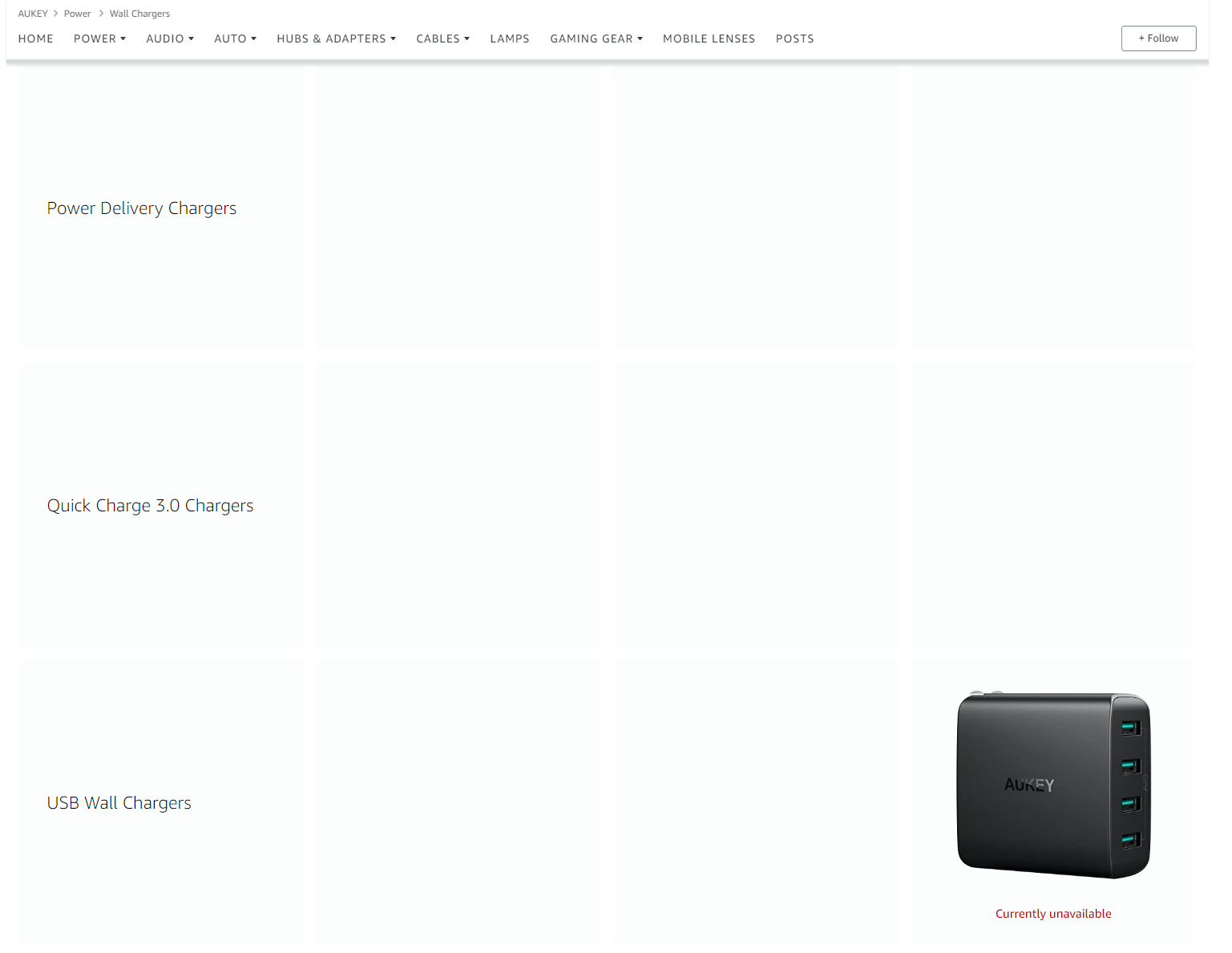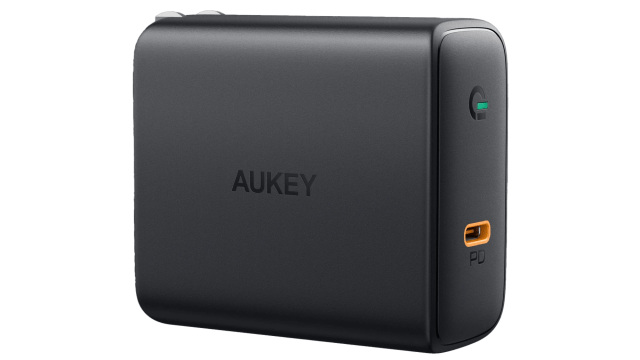Aukey makes good chargers, or so the many reviews and roundups of them lead me to believe. However, if you’ve been Amazon shopping lately, you might be surprised to find Aukey’s portfolio of products mysteriously missing.
Just look at Aukey’s digital storefront, for example:

All those grey boxes? Yeah, those should be filled with products, not nothingness. Aukey appears to be having a big problem on Amazon; of the products that even still have listings, I can’t find anything you can actually purchase from the megalithic retailer directly.
As for why it’s happening, Amazon isn’t saying directly why Aukey is enjoying a not-so-low-key banishment, but it’s pretty clear what the company is implying in a statement it’s providing to various media outlets (emphasis mine):
We work hard to build a great experience for our customers and sellers and take action to protect them from those that threaten their experience in our store. We have systems and processes to detect suspicious behaviour and we have teams that investigate and take action quickly.
We have long-standing policies to protect the integrity of our store, including product authenticity, genuine reviews, and products meeting the expectations of our customers. We take swift action against those that violate them, including suspending or removing selling privileges. We take this responsibility seriously, monitor our decision accuracy and maintain a high bar. We have an appeals process where sellers can explain how they will prevent the violation from happening in the future or let us know if they believe they were compliant. Our teams are based in our Seattle headquarters and around the globe in order to provide sellers with 24/7 support via email, phone, and chat in more than 15 languages.
What does this mean for you? Well, for starters, this explains all the broken links you’ll encounter from all the various e-commerce articles that are affiliate-linking to Aukey products on Amazon. Aukey isn’t dead; it’s just in the penalty box right now. Though, it’s unclear whether this is a permanent removal from Amazon or just a time-out.
And nothing is wrong with any Aukey devices you already own; however, I would be a bit more sceptical about reviews praising the company’s various products. It’s one thing if a trusted reviewer or website that regularly covers a tech category has a lot of praise for an Aukey USB-C charger; it’s another if you’re reading a tweet from a random person, or a review left on a retailer’s storefront. I might not trust their opinion, especially when it’s been revealed that Aukey has basically been paying for praise:
https://twitter.com/a/status/1391838929360457743
Of course, Aukey isn’t the only company on Amazon pulling these shenanigans. Mpow is also caught up in Amazon’s recent ban — permanent or temporary — and plenty of other companies on Amazon are shady with paid-for reviews. For example:
“how some Amazon vendors figured out a quiet way to solicit and pay for fake five-star reviews”
Recently ordered a Juusmart lightning cable+wall charger and TWICE @amazon sent AISNI instead, w/a card in box:
“Get a $10 Amazon Gift Card.
Leave us a customer review not feedback”— Julie – Post, Threads, Bluesky (@nihonmama) May 10, 2021
I ordered a resistance band from Amazon. And inside the package there were one card written “message us on whatsapp, we will give 100 cashback” and when i messaged on that no. this is the chat in screenshots. So, Amazon is taking paid ‘5 star’ reviews.@amazonIN @Sirfira_trader pic.twitter.com/2cJMMro7x4
— Ritesh Dwivedi (@itsRdRitz) May 11, 2021
How do you avoid fake reviews?
In addition to your healthy dose of scepticism for random reviews, you should also consider installing an extension like Fakespot or ReviewMeta to help you figure out what products seem legitimately reviewed and which seem…overly boastful.
Beyond that, SafetyDetectives has a large list of tips you should keep in mind when you’re trying to figure out whether a product’s reviews are honest or not. They include:
- Be sceptical of extreme reviews. The ‘perfect’ product rarely exists. If a product has a ton of overbearingly positive reviews (especially when compared to similar products), you should question the legitimacy of those reviews. You should also look out for reviews that are 100% positive or 100% negative.
- Look for suspicious language. Fake reviews often use less emotional language, and they can be hard to read. A fake review may even read like an advert, badmouthing the product’s competitors in the process.
- Look for generic statements about the product. Several of the five-star reviews may highlight the same plus points, or the reviews could generally lack variance – not revealing anything about each individual’s specific experience. Fake reviews might contain lots of generic keywords, too, or reference the brand’s name multiple times.
My favourite trick is an easy one: Don’t read the five-star reviews. Go read the one- and two-star reviews to check a product’s potential deficiencies (especially if a lot of people are saying the same thing about a particular aspect of what you’re purchasing). Bonus points if those reviews call out other reviews for being fake or suspicious; then you know you might have a product on your hands that warrants more investigation than a simple “Buy it now.”

Leave a Reply
You must be logged in to post a comment.